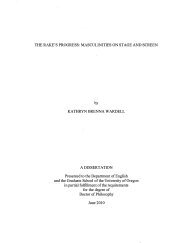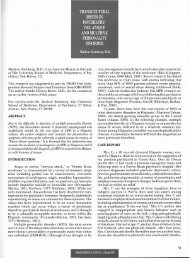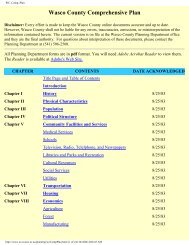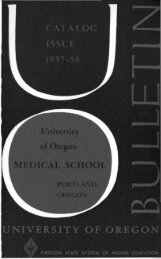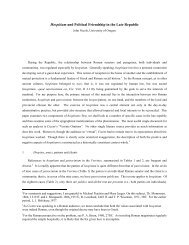~EGULAR SESSION - University of Oregon
~EGULAR SESSION - University of Oregon
~EGULAR SESSION - University of Oregon
You also want an ePaper? Increase the reach of your titles
YUMPU automatically turns print PDFs into web optimized ePapers that Google loves.
196 COLLEGE OF LIBERAL ARTS<br />
properties <strong>of</strong> crystals; theory <strong>of</strong> the behavior <strong>of</strong> electrons in crystals. Optical<br />
spectroscopy-perturbation <strong>of</strong> atomic-energy levels due to high pressure and<br />
temperature.<br />
A qualifying examination for first-year graduate students is given at the beginning<br />
<strong>of</strong> the fall term. The examination is restricted to questions in the fields<br />
<strong>of</strong> mechanics and electricity. Students who show a lack <strong>of</strong> adequate preparation in<br />
either <strong>of</strong> these fields are required to take an appropriate undergraduate course,<br />
for which no graduate credit is given.<br />
Course requirements for a master's degree with a major in physics normally<br />
include, in addition to the substantial equivalent <strong>of</strong> the undergraduate requirements<br />
listed above: two year sequences in physics, at least one <strong>of</strong> which must be a 500<br />
sequence; and one <strong>of</strong> the following sequences in mathematics-Advanced Calculus<br />
(Mth 431, 432, 433), seminar in applied mathematics (Mth 507), Theory <strong>of</strong><br />
Functions <strong>of</strong> a Real Variable (Mth 551,552,553), Theory <strong>of</strong> Functions <strong>of</strong> a Complex<br />
Variable (Mth 554, 555, 556), Topics in Classical Analysis (Mth 557, 558,<br />
559).<br />
LOWER-DIVISION COURSES<br />
Ph 101, 102, 103. Essentials <strong>of</strong> Physics. 3 hours each term.<br />
Fundamental principles <strong>of</strong> physics, intended for students not majoring in<br />
science; requires less mathematical preparation than Ph 201, 202, 203. 3 lectures.<br />
Prerequisite: Mth 110. Dart.<br />
Ph 104. Descriptive Astronomy: Solar System. 4 hours fall.<br />
Descriptive treatment <strong>of</strong> the solar system, including the sun, eclipses, planets,<br />
comets, and meteors. 4 lectures. Ebbighausen.<br />
Ph 105. Elementary Meteorology. 4 hours winter.<br />
Elementary treatment <strong>of</strong> weather phenomena, including discussion <strong>of</strong> instruments,<br />
cloud types, fog and rain production, frontal phenomena, and map<br />
analysis. 4 lectures. Ebbighausen.<br />
Ph 106. Descriptive Astronomy: Stellar System. 4 hours spring.<br />
Descriptive treatment <strong>of</strong> the stellar system, including variable and double<br />
stars, clusters, galaxies, and extragalactic nebulae. 4 lectures. Ebbighausen.<br />
Ph 201, 202, 203. General Physics. 4 hours each term.<br />
First-year college physics. Special section for Honors College and other<br />
superior students. 4 lectures. Prerequisite: mathematics equivalent <strong>of</strong> Mth<br />
104, 105 or consent <strong>of</strong> instructor. Powell, Kemp.<br />
Ph 204, 205, 206. General Physics Laboratory. I hour each term.<br />
Planned to accompany Ph 101, 102, 103 or Ph 201, 202, 203. I two-hour laboratory<br />
period.<br />
UPPER-DIVISION COURSES<br />
(Unless an exception is noted in the course description, general ph:)'sics and ca/nt/us<br />
are prerequisite to all1tpper-divisian and graduate cO'Hrses.;<br />
Ph 320, 321, 322. Advanced General Physics. 4 hours each term.<br />
Fundamental principles <strong>of</strong> Newtonian mechanics; brief introduction to Lagrange's<br />
equations; thermodynamics and kinetic theory <strong>of</strong> gases; introduction<br />
to statistical mechanics. 4 lectures. Crasemann.<br />
Ph 401. Research. Hours to be arranged.<br />
Ph 405. Reading and Conference. Hours to be arranged.<br />
Ph 409. Special Laboratory Problems. Hours to be arranged.<br />
UPPER-DIVISION COURSES CARRYING GRADUATE CREDIT<br />
Ph 407. Seminar. (G) Hours to be arranged.<br />
Ph 411, 412, 413. Modern Physics. (G) 3 hours each term.<br />
Introduction to the fundamental concepts <strong>of</strong> atomic, nuclear, and solid-state




